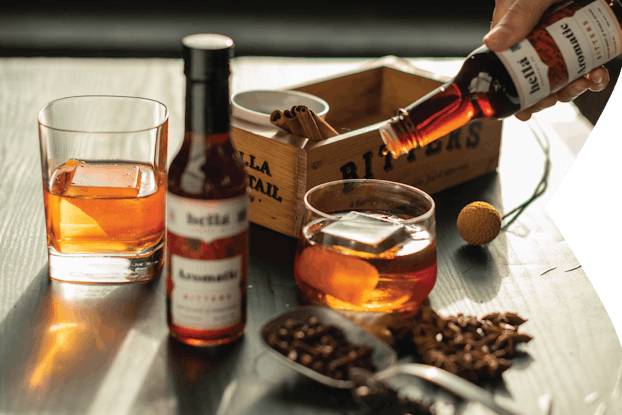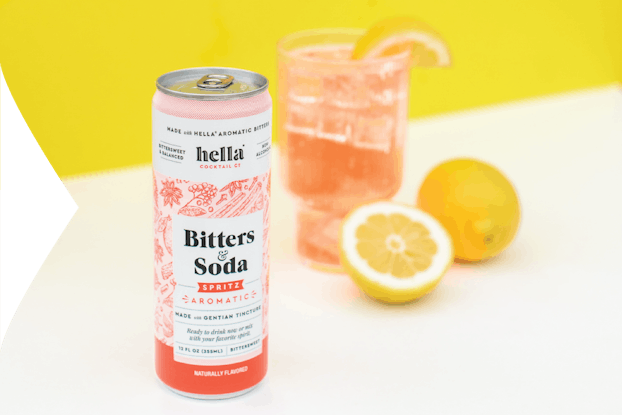
Key Takeaways:
- Mixology startup carves a new niche in the spirits industry via crafted bitters and alcohol-free drinks.
- The Black-owned brand celebrates its community in product development to marketing.
- The strategy has landed Hella Cocktail distribution from Whole Foods and West Elm to Delta Airlines.
In the spirits industry, trends come and go. The craft beer craze evolved into hard cider, then hard seltzer and the list goes on, with a host of other new beverage brands waiting in the wings looking to capture the wandering interest of the millennial consumer.
The category is also dominated by legacy brands, many more than a century old. Jim Beam, Jack Daniels, or Johnnie Walker, to name a few, have the kind of brand equity that tends to transcend trends. Jomaree Pinkard, CEO and co-founder of millennial-friendly mixology brand Hella Cocktail, believes his company has what it takes to grow a trendy new product into one that can live on for generations.
Offering premium cocktail mixers as well as small-batch crafted bitters, the brand has most recently expanded into ready-to-drink cans of bitters and soda that are free of alcohol and sugar and come in a range of natural flavors.
So far, the brand is available in restaurants and bars, as well as on the shelves of premium grocery stores including Whole Foods, and even offered as an in-flight beverage option from Delta Airlines.
Though the pandemic has obviously affected its hospitality and travel partners like Delta, it has also helped the brand connect more closely with its end consumers and supported the expansion of the direct online sales channel.
“What we did [last] year was took two steps back and dug deeper in to find the white space,” Pinkard told CO—. As a Black-owned business, Pinkard and his team are also carving out a new space in the industry, with a commitment to celebrating its community and reflecting the brand’s values in every move it makes, from product development to marketing.
I’m not conservative in my willingness to innovate, but I am conservative with taking other people’s money. We bootstrapped the company not because we don’t want to grow but because we want to grow at our own pace.Jomaree Pinkard, CEO and co-founder, Hella Cocktail
Bringing a hobby to life
Hella Cocktail began as a hobby shared between three young friends in New York City. “What we would do is compete at home,” Pinkard said, “and try to one-up each other making a cocktail. The secret sauce back then was always cocktail bitters.”
Bitters, a potent tonic made of macerated botanicals roots and spices, are often added to cocktails in small amounts to enhance other flavors, similar to the use of salt in cooking. Though Angostura are the most well-known, there are many flavors of bitters using combinations of everything from lavender to orange.
The three friends eventually started making their own bitters, which they started selling to friends in the hospitality industry. “It got some traction,” said Pinkard, among the hipster bartenders of Brooklyn and the Lower East Side, “so we decided to make it a little bit more real. The inspiration was really about sharing ourselves.”
They realized the viability of Hella Cocktail as a potentially successful consumer product when two of the biggest home goods retailers came calling. “Our big break came in 2014, when Crate & Barrel and West Elm wanted to add things to their bar accoutrement program,” said Pinkard.
What was at the time a huge order for the company enabled further growth, followed up with expansion into more nationwide retailers like Whole Foods. According to Pinkard, the brand’s pre-pandemic sales were near evenly split between retailers and hospitality partners. Now, he told CO—, it’s 40% hospitality, 40% retail and 20% direct online sales.
“I think this is where the curve was going anyway,” Pinkard said. “But we made a bet in terms of building out our e-commerce infrastructure. Now it’s paying off because people have been forced to go that route maybe faster than they naturally would have.”

The post-pandemic rise of ‘thoughtful consumption’
To reach its target customers, who in Pinkard’s own words “are in discovery mode and want to connect with a brand with an identity that reflects their own,” Hella Cocktail is pursuing a new approach to imbibing and conviviality that prioritizes choice and optionality over indulgence and inebriation.
Many health-conscious young people are choosing to not drink or simply drink less, leading to the rise of terms like “sober curious” and the popularity of Dry Januarycommitments. According to a report by trend forecasting agency Cassandra, one-third of U.S. consumers surveyed were interested in trying low- or no-alcohol beverages.
Pinkard believes the COVID-19 pandemic has been a factor in many people’s decisions to be more thoughtful about the things they consume and the ways they spend their time, whether that means experimenting with sobriety, shifting to higher quality beverages or skipping Zoom happy hour.
“What’s happened over the last year or so is that people are really particular about what they engage in, especially online,” he said. “[Post-pandemic], I think people are going to appreciate common interest spaces more; something like a dinner club that you go to because you care about the chef, rather than just going out of dinner.”

A new approach to millennial brand-building
By 2020, cracks had started to show in the stereotypical DTC brand strategy. After taking in venture capital money and spending it quickly on pricey customer acquisition marketing, high-profile brands like Outdoor Voices and Casperfelt the pain of expanding too quickly without the profits to match.
“VC-backed DTC businesses try to short-circuit the process of brand-building when, in fact, it takes many years to build a consumer brand that is long-lasting,” wrote Andrew Oved, managing director of VC firm Reformation Partners, in a recent Medium post. This aligns with Pinkard’s own philosophy. By bootstrapping from the beginning, Pinkard and his team at Hella Cocktail have taken a slower, more traditional approach to building a business.
“I’m not conservative in my willingness to innovate, but I am conservative with taking other people’s money,” he said. “We bootstrapped the company not because we don’t want to grow but because we want to grow at our own pace.”
Pinkard believes that commitment to “going their own way” comes through in both the team he hires and the products Hella Cocktail creates. “The consumer is not buying us because we’re $2.99,” Pinkard added. “It’s showing up in their home for some reason beyond just wanting a cocktail mix.”
CO— aims to bring you inspiration from leading respected experts. However, before making any business decision, you should consult a professional who can advise you based on your individual situation.
Follow us on Instagram for more expert tips & business owners stories.
CO—is committed to helping you start, run and grow your small business. Learn more about the benefits of small business membership in the U.S. Chamber of Commerce, here.

What can membership do for your business?
Gain tools to stay informed, competitive, and connected by becoming a U.S. Chamber of Commerce member. Membership gives you direct access to expert policy insights, economic updates, and exclusive resources designed to help your business thrive. From behind-the-scenes analysis from D.C. to exclusive discounts and expert support, U.S. Chamber membership helps you navigate change and seize new opportunities.







